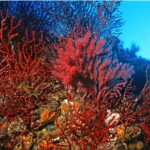The sea, for me, is the place I go to for deep contemplation and connection. It’s where I feel suspended in time, as one with the elements, in touch with the deeper layers of my soul. Saltwater washes away my doubts, it heals my wounds, it quells my fears. Nothing compares to the sense of peace that pervades my senses when I’m submerged and surrounded by the graceful creatures of the mysterious blue.
I grew up with the Mediterranean Sea. It envelops every shore of Italy, and my childhood is etched with memories of the sun disappearing into its depths. Our family would look for a type of vongole in shallow waters, and collect the plastic lollipop sticks on the beach. I remember when I was ten, a dermatologist prescribed me the sea for my dry skin, and my parents made sure every once in a while my feet touched the Med to heal.
In my 20s my passion for the deep deepened, and I was very privileged to witness the beauty of several other seas. From the volcanic islands of the Pacific, to the mystic force of the Atlantic, and the abundant coral reefs in the Indian Ocean and the Red Sea. As I traveled abroad in search of the euphoria I felt from a pod of dolphins swimming around me, I realised a disturbing truth: the Mediterranean is dying. The monk seals left, the whales rarely visit, the turtles avoid it, the coral has become jewellery, the schools of fish a by-gone memory, and its sharks are killed every day. Meanwhile, everyone in Europe happily refers to it as a swimming pool (including my past self).
A deep sadness overwhelms me now when I swim the empty blues of the Mediterranean Sea, longing for a creature to swim with me. Perhaps it’s time Mediterraneans took responsibility for their dying Sea. Perhaps it’s time it was officially recognised as a swimming pool, a place of recreation devoid of the ecosystems that support life. Maybe then its human inhabitants will start regenerating what was once the enchanted sea of sirens.
Isabella Cavalletti is a storyteller and co-founded eco-nnect.













